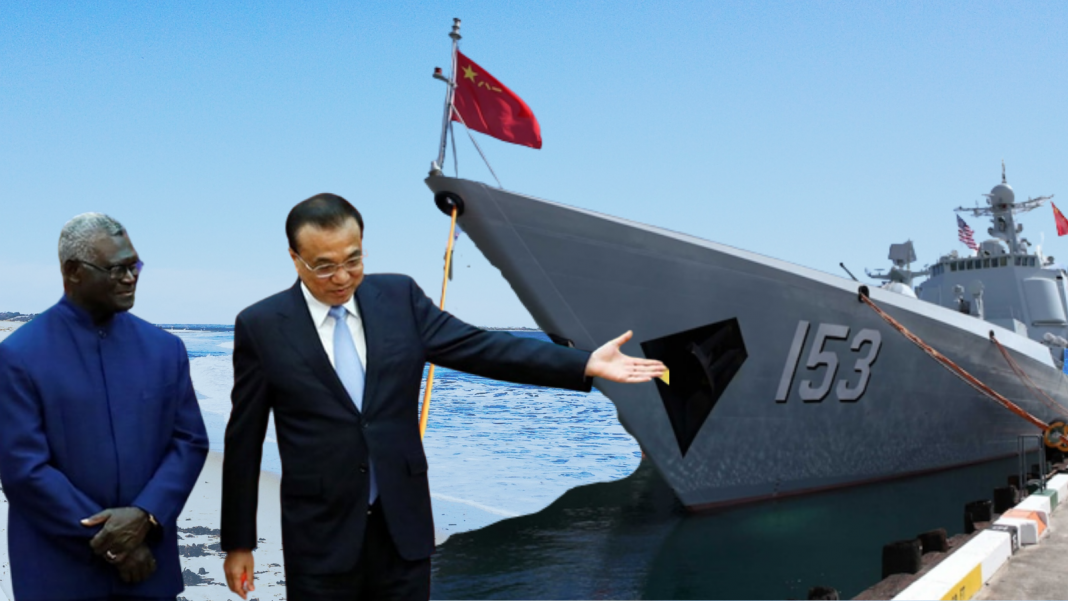China’s security agreement pact with Solomon Island is under scrutiny. Many nations like the US, Australia, New Zealand, Japan etc., has been resonating the sounds of concern over the agreement, which looks like another strategic encroachment by the Chinese, based on their personal interest.
Before Solomon Islands Prime Minister Manasseh Sogavare could announce the actual signing of the pact, a draft of the agreement was leaked which had sparked the issue. The Island did not make statements regarding the leaked document, nor did it deny or confirm if it was the finalised version.
This notion has triggered alarm in the Indo-Pacific. While many has stated that they respect the Pacific island’s right to make sovereign decision, they also questioned the possibility of the establishment of a permanent presence such as a military base. Stating that if the contents in the leaked papers were legit, the conditions listed were very alarming as Solomon Island faces no external security threat that would justify the level of military and intelligence presence, the agreement brought about.
Red flags of the agreement:
- China can send military personnel, intelligence and information support, police, and other armed personnel to the Solomons.
- China would be allowed to make ship visits
- This means that Sogravare can request China for law enforcement to suppress his domestic rivals.
- Can pose as a great risk to the Island’s weak democracy.
Australia in particular has been set on the edge with the announcement of this as the Island nation is very close by in its territorial waters.
Besides Solomon, China has made two other security focused deals in other parts of the world, out of which one resulted in China’s first establishment of military base in Djibouti.
China’s peak interest in all the geo strategic positioned nations:
Everytime China makes a deal or investment through its Belt&Road Initiative or any agreement is signed, it immediately gets attention because of the famous slow “death-trap” or what the world would call “debt-trap” policy China is known for.
China’s growing influence and interest in Pakistan, Nepal, Sri Lanka and Maldives can be studied to understand how it’s positioning itself in an attempt to pressure India. Beijing’s engagement in the Indian Ocean region has raised eyebrows in many occasions.
Sri Lanka is the epitome of understanding how China policy works:
China-Sri Lanka’s relationship had long been amicable. But this relationship became more prominent when a 26-year-long civil war broke out in Sri Lanka with ethnic Tamil separatis. Under the leadership of Mr. Rajapaksa who was elected in the year 2005, Sri Lanka started depending heavily towards China for economic support, military equipment and also took loans in bulk for various development projects. Mr. Rajapaksa’s tenure came to an end in 2015.
Studies were against the idea of building a port in Hambantota but the reason for the former President to be so personally involved in pushing the project was mostly driven by the funds that were going into his electoral campaign. A New York Times report published in 2018 alleged that the Chinese had paid the Rajapaksas substantial sums to see the project through. The NYT even listed specific details of how China Harbour, the company that had built the port, were involved in financing the brothers campaign during the country’s 2015 parliamentary election, from funding cash to clothes for supporters.
Unfortunately, the port was signed over to Beijing on a 99 year lease because the country failed to repay loans it took in the first place to build it.
Same vision in-stored for Maldives:
Likewise, Maldives have also taken lots of funds from China during Yameen’s period. The debt was burdening so much on the country’s small economy that experts has warned that Maldives might not be able to pay back its loans and would most likely have to compromise by giving away its land.
There has been speculations in the past where China was rumored to have plans on setting up a military base in Maldives. Though nothing concrete came out of this as the entire world had its eyes set on the moves of China, the locals reported about Chinese naval ships being docked in Maldivian waters.
China always bets on the winning horse, “investment with a return interest”
“Non-interference” is what China says it strictly follows by but interference with invitation is a different case.
When China invests, the geo location is always vital, but besides this if we look closely at the pattern, she also invests/bets on the person who is incharge of the nation.
Be it Sri Lanka, Maldives or Solomon Islands, China’s influence bloomed when the heads were pro-Chinese.
Another factor is, China always looks for nations that’s politically troubled and has weak institutions.
The Washington-based think tank, Center for Global Development warned that 23 of the 68 countries benefiting from Belt and Road investments were significantly or highly vulnerable to debt distress. The report stated that around eight nations will find themselves vulnerable to above-average debt: Djibouti, Kyrgyzstan, Laos, the Maldives, Mongolia, Montenegro, Pakistan, and Tajikistan.
The Solomon Islands security deal with China might just be another wake-up call, not only for Australia, its western allies but for every other nation to understand how fast China is growing as a super power.


















